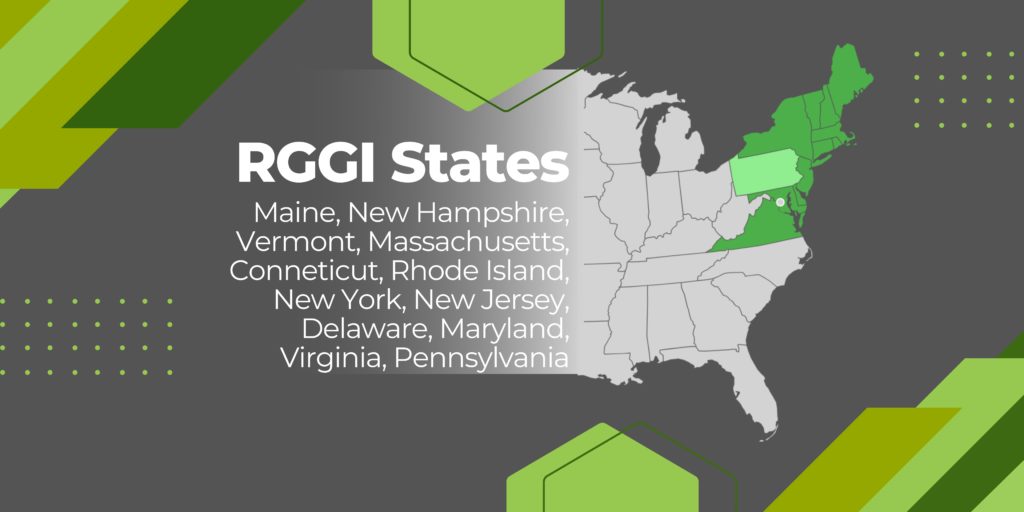Pennsylvania’s Department of Environmental Protection recently joined the Regional Greenhouse Gas Initiative (RGGI). RGGI is a multi-state cooperative program that regulates CO2 emissions from fossil fuel power plants with a capacity of 25 megawatts or greater. “The Economic Impacts of RGGI on 9 Northeast and Mid-Atlantic States Report” conducted by the Analysis Group reports that program generated approximately $1.4 billion in economic value between 2015 and 2017 in addition to generating environmental and health benefits for the public.
RGGI generated approximately $1.4 billion in economic value between 2015 and 2017 in addition to generating environmental and health benefits for the public.
The Economic Impacts of RGGI on 9 Northeast and Mid-Atlantic States Report
How Does RGGI Work?
RGGI is the first cap-and-trade program of its kind to be implemented in the United States. Since Pennsylvania joined the program this year, RGGI now includes 12 states on the East Coast. Each participating state sets an allowable limit of CO2 emissions based on its size.
State programs vary in structure and complexity. Pennsylvania’s DEP determines the cap of CO2 emissions and distributes carbon credits to the market through quarterly auctions. Funds generated by selling bon credits are invested in carbon offset projects. The amount of carbon credits a state issue is reduced decreases each year. These two market-based mechanism work to reduce emissions over time.

Cap and Invest: Saving the Planet while Making Money for PA
In addition to ensuring uniform terms and creating transparency in carbon credit pricing, PA’s carbon auction market will increase investment in renewable energy sources. This will increase Pennsylvania’s Gross State Product, the state’s key indicator of economic growth.
What does RGGI mean for your business?
The implications of RGGI for your business depend on where you are in the carbon value chain. Direct producers of energy are required to report direct emissions to the state, which would be recorded as Scope 1 emissions according to the Greenhouse Gas Protocol. Consumers of power categorize these emissions as either Scope 2.
Green Impact’s Net Zero Cloud is custom built to help companies quickly categorize their emissions across Scopes 1, 2 & 3 to make speed up and simplify compliance with regulations like RGGI.
Green Impact’s Net Zero Cloud is custom built to help companies quickly categorize their emissions across Scopes 1, 2 & 3 to make speed up and simplify compliance with regulations like RGGI.
What happens next?
Power plants are required to hold credits equal to their CO2 emissions over a three-year control period. Sources were required to account for their emissions beginning July 1, 2022. The DEP is now in the process of establishing the number of allowances for each power plant. Facilities have until March 1, 2023 to account for 50 percent of their 2022 emissions and until March 1, 2024 to account for 100 percent of their 2022 emissions. Power plants will be required to have 50 percent of their 2022 required allowances by March 1, 2023 and 100 percent of required allowances by March 1, 2024.
“Facilities have until March 1, 2023 to account for 50 percent of their 2022 emissions and until March 1, 2024 to account for 100 percent of their 2022 emissions. Power plants will be required to have 50 percent of their 2022 required allowances by March 1, 2023 and 100 percent of required allowances by March 1, 2024”.
PA Department of Environmental Protection
Benefits of RGGI
The DEP estimates that joining RGGI will have large-reaching environmental, economic, and health benefits for Pennsylvania, based on performance in other states. “The annual average CO2 emissions from RGGI electric generation sources decreased by 48 percent between the base period of 2006 – 2008 and the period of 2016 – 2018,” according to the 2018 Monitoring Report conducted on RGGI.
“The annual average CO2 emissions from RGGI electric generation sources decreased by 48 percent between the base period of 2006 – 2008 and the period of 2016 – 2018″
RGGI 2018 Monitoring Report
Not only will RGGI help the environment, but it will also have a positive effect on public health and the economy. The DEP anticipates reductions of up to 225 million tons of carbon pollution from Pennsylvania power plants by 2030, preventing up to 300,000 hospital visits for respiratory illnesses, such as asthma, that are caused by air pollution, and having a net increase of 30,000 jobs by 2030.
The Power of Pennsylvania’s Participation
Pennsylvania is the first major fossil fuel producer to join RGGI. According to the U.S. Energy Information Administration’s study on Energy-Related Carbon Dioxide Emissions by State Between 2005-2016, Pennsylvania had the fourth highest energy-related carbon dioxide emissions in the country in 2016. The only states to outrank PA in emissions are Texas, California, and Florida. Requiring large CO2 emitters to engage with carbon trading will advance other efforts to combat climate change as well.
RGGI provides an opportunity for Pennsylvania’s economy, public health, and natural environment to thrive as we look towards a greener future. While these changes are universally positive, RGGI compliance might pose a challenge to some businesses.
Unsure where to get started? Schedule a free Net Zero Cloud demonstration today.